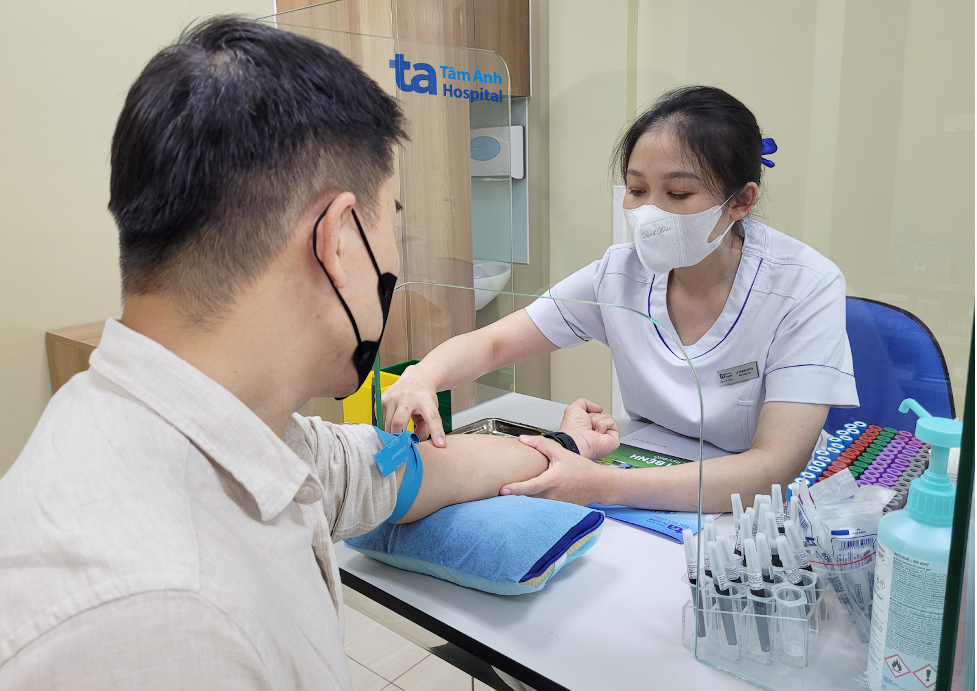Dr. Nguyen Phuong Thao of the Fetal Medicine Unit at Tam Anh General Clinic, District 7, explains that stroke is a complex condition with multiple risk factors, including underlying genetic disorders.
Specifically, the MTHFR gene mutation, particularly the C677T variant (rs1801133), can elevate homocysteine levels in the blood. High homocysteine can damage blood vessel lining, accelerating atherosclerosis, hypertension, and blood clot formation.
"People with this variant have a higher stroke risk than the general population," Dr. Thao explains, adding that the A1298C variant in the MTHFR gene is also found in many stroke patients.
The H63D mutation in the HFE gene (hereditary hemochromatosis) increases iron accumulation, potentially damaging blood vessels. The Prothrombin G20210A mutation is also linked to increased blood clotting, contributing to ischemic stroke. Dr. Thao cites research showing a 1.5 times higher stroke risk in carriers under 55.
The NINJ2 gene mutation can increase inflammation in blood vessel lining, promoting atherosclerosis and raising the risk of ischemic stroke. "This genetic abnormality increases stroke risk by 30%, but it's not the sole cause," says Dr. Thao.
Other single-gene disorders linked to hereditary stroke include mutations in the NOTCH3 (CADASIL), HTRA1 (CARASIL), and COL3A1 (vascular Ehlers-Danlos) genes. Mutations in supplementary genes like factor V, ACE, PAI-1, and XIII are also associated with stroke risk, but they manifest less clearly.
 |
Blood test for genetic screening. Illustrative photo: *Tam Anh General Clinic, District 7* |
Advances in science and technology, particularly genetics, allow genetic screening to identify abnormal genes that increase the risk of underlying conditions leading to stroke. However, Dr. Thao cautions that genetic screening for stroke isn't recommended for everyone. Genetic testing serves different purposes in specific cases:
Individuals who have experienced an ischemic stroke or transient ischemic attack (TIA) should be screened for CYP2C19 gene variants. This helps determine the appropriate anticoagulant medication, preventing recurrent strokes.
Those with early-onset stroke (under 50) of unknown cause, or with a family history, should also undergo genetic screening. Single-gene abnormalities like CADASIL, CARASIL, and vascular Ehlers-Danlos can cause strokes in younger people. Doctors may recommend NOTCH3, HTRA1, and COL3A1 gene testing in these cases.
Individuals with moderate cardiovascular risk (hypertension, dyslipidemia, obesity, diabetes) can undergo genetic screening to assess risk and prevent complications like heart attacks and strokes.
While genetic abnormalities can increase stroke risk, Dr. Thao emphasizes the importance of a healthy lifestyle in reducing this risk. This includes limiting salt intake to under 5 g (one teaspoon) daily, increasing consumption of fruits, vegetables, whole grains, and lean meats like chicken and fish to control blood pressure and cholesterol, and limiting fatty foods, sweets, fast food, and processed foods.
Regular exercise for at least 30 minutes daily or 150 minutes weekly is recommended, with activities like brisk walking, cycling, swimming, and yoga. These exercises improve blood circulation, stabilize blood pressure, reduce stress, and control weight (BMI between 18.5 and 24.9). Individuals with underlying conditions like hypertension, diabetes, dyslipidemia, or atrial fibrillation should adhere to their treatment plans, monitor blood pressure at home, and attend regular check-ups for effective disease management.
Ngoc Chau
| Readers can submit questions about neurological diseases here for doctor's answers. |












